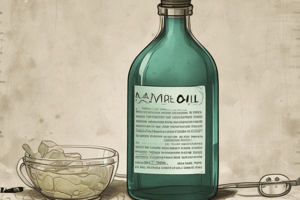Podcast
Questions and Answers
What is the primary characteristic of this substance that makes it useful in pharmaceutical applications?
What is the primary characteristic of this substance that makes it useful in pharmaceutical applications?
- Its flammability
- Its solubility in organic solvents (correct)
- Its high boiling point
- Its neutral pH
What is the primary concern when handling this substance?
What is the primary concern when handling this substance?
- Its low boiling point
- Its potential to cause skin and eye irritation (correct)
- Its high density
- Its reactivity with water
In which industry is this substance used as a lubricant and rust inhibitor?
In which industry is this substance used as a lubricant and rust inhibitor?
- Medical applications
- Cosmetic industry
- Industrial applications (correct)
- Food industry
What is the most significant advantage of using this substance in wound dressings and surgical implants?
What is the most significant advantage of using this substance in wound dressings and surgical implants?
What is the primary reason why this substance is used in food packaging and wrapping materials?
What is the primary reason why this substance is used in food packaging and wrapping materials?
What is the reason behind a liquid's ability to withstand a slight amount of tension?
What is the reason behind a liquid's ability to withstand a slight amount of tension?
What is the term used to describe the apparent shear resistance between two adjacent layers of a liquid?
What is the term used to describe the apparent shear resistance between two adjacent layers of a liquid?
What is the assumption made about a liquid's volume under compression?
What is the assumption made about a liquid's volume under compression?
What is the characteristic of a liquid that makes it nearly incompressible?
What is the characteristic of a liquid that makes it nearly incompressible?
What is the primary characteristic of a liquid that affects its behavior?
What is the primary characteristic of a liquid that affects its behavior?
Flashcards are hidden until you start studying
Study Notes
Properties
- Colorless and transparent liquid
- Odorless and tasteless
- Neutral pH
- Density: 0.82-0.88 g/cm³
- Boiling point: 320-340°C
- Flash point: 170-200°C
- Solubility: Insoluble in water, soluble in organic solvents (e.g., acetone, ethanol)
Uses
- Cosmetic and pharmaceutical industries:
- Emollient and moisturizer in skincare products
- Base for ointments and creams
- Industrial applications:
- Lubricant and rust inhibitor
- Fuel and energy production
- Textile and leather finishing
- Food industry:
- Food additive and coating
- Packaging and wrapping materials
- Medical applications:
- Wound dressings and surgical implants
- Pharmaceutical coatings and capsules
Safety and Precautions
- Flammable and combustible
- May cause skin and eye irritation
- May cause respiratory problems if inhaled
- Handle with caution and follow proper storage and disposal procedures
Physical Properties
- A colorless and transparent liquid with a neutral pH
- Odorless and tasteless
- Density ranges from 0.82-0.88 g/cm³
- Boiling point: 320-340°C
- Flash point: 170-200°C
- Insoluble in water, but soluble in organic solvents like acetone and ethanol
Applications
- Cosmetic and pharmaceutical industries: used as an emollient and moisturizer in skincare products and as a base for ointments and creams
- Industrial applications: used as a lubricant and rust inhibitor, in fuel and energy production, and in textile and leather finishing
- Food industry: used as a food additive and coating, and in packaging and wrapping materials
- Medical applications: used in wound dressings and surgical implants, and in pharmaceutical coatings and capsules
Safety Precautions
- Flammable and combustible
- May cause skin and eye irritation
- May cause respiratory problems if inhaled
- Handle with caution and follow proper storage and disposal procedures
Properties of Liquids
- Liquids possess a definite volume due to their negligible change in volume under compression.
- Liquids are often assumed to be incompressible due to their minimal contraction under compression.
- Liquids exhibit a slight degree of tension due to intermolecular attraction between particles.
- This intermolecular attraction leads to an apparent shear resistance between adjacent layers, known as viscosity.
Studying That Suits You
Use AI to generate personalized quizzes and flashcards to suit your learning preferences.




